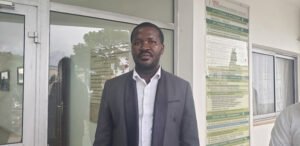2024 Humanitarian Response Plan: 1.2 million Vulnerable Cameroonians in need of vital health services

Access to essential services such as health, education, water, and sanitation is challenging in some localities in Cameroon, exacerbated by insecurity and climate shocks.
An estimated 1.8 million people needed lifesaving access to water, hygiene and sanitation (WASH) services in crises affected regions in Cameroon, in 2023, according to a recent report published by the United Nations Office for the Coordination of Humanitarian Affairs, OCHA.
By the end of December 2023, 954,000 vulnerable people benefited from improved access to safe drinking water and basic sanitation. The response included the construction of water supply facilities and emergency latrines, chlorination of water sources, disinfection of households, distribution of hygiene kits and aqua tabs, and promotion of hygiene and sanitation services and messages. In the Far North region, 68,750 people benefited from the construction of water points, emergency and family latrines, WASH kits and awareness messages. More than 498,223 people benefitted from similar services in the North-West and South-West regions.
In January 2024, 28,000 people received various WASH services including the construction of 12 latrines and distribution of 710 WASH kits, in the North-West and South-West regions. Most of the beneficiaries benefitted from social and behavioural change activities, such as hygiene promotion, menstrual hygiene management, and community-led sanitation.
Access to safe drinking water, adequate sanitation facilities, and hygiene promotion are essential to prevent the spread of diseases such as cholera and diarrhoea, and to prevent malnutrition. Improving access to water, hygiene and sanitation also contribute to protect the dignity and well-being of the affected populations and reduce the risk of gender-based violence. The WASH response in Cameroon remains largely underfunded and constrained by insecurity and access challenges. More resources and support are needed to ensure that affected populations receive timely and adequate WASH assistance.
Insecurity hampering crises affected populations’ access to healthcare
Violence against healthcare personnel and infrastructures continue to be reported in crises affected areas in Cameroon.
In 2023, at least 16 incidents of violence against or obstruction of health services were reported, including 12 in the North-West and South-West and four in the Far North regions. Most of these incidents involved national health workers, including killings, physical assault, abductions, extortion, and threats by parties. Some health infrastructures in these regions have been damaged and medical equipment looted. In the North-West and South-West regions, some health workers have reportedly resigned for fear of reprisals from parties to the crisis.
In January 2024, six incidents affecting healthcare were reported in the North-West region alone, including interference and disruption of healthcare services, attacks on health personnel, confiscation of hospital property and temporary detention of health personnel.
This situation has a significant impact on the ability of crisis-affected communities to access basic health services. In the Far North, North-West and South-West regions some health facilities have been closed for several years due to repeated attacks by non-State armed groups (NSAGs), some of them have been destroyed by fire. Affected populations, particularly internally displaced persons (IDPs), returnees and host communities, face challenges in accessing health care due to insecurity, limited availability and affordability of health services, lack of transportation and fear of stigmatization. The crises have also increased the vulnerability of women and girls to sexual and reproductive health risks, such as unwanted pregnancies, unsafe abortions, sexually transmitted infections, and gender-based violence (GBV).
In 2024, humanitarian partners target 1.1 million people and aim to improve access to essential health care for crisis-affected populations, including holistic care for GBV survivors, physical and psychological care for victims of trauma, and ensuring dignified and safe childbirth for women.
Addressing the needs and rights of women and girls exposed to GBV in crises-affected areas in Cameroon
In crises-affected areas, women, and girls, including women with disabilities, adolescent girls, and widows, are most exposed to gender-based violence (GBV). Some of the most severe impacts of GBV and sexual violence include injuries, mutilations, trauma, unwanted pregnancies, and sexually transmitted diseases. Social and psycho-social impacts such as isolation, rejection, suicidal thoughts, stigmatization, shame, mental disorder, and stress were also reported. While women and girls try to cope positively through support from supporting organizations, community or religious leaders for instance, negative coping mechanisms have devastating impact, and include substance abuse and survival sex. Tailored GBV preventive services and responses are required for the protection of at-risk groups, with a focus on individual specific needs.
Situations of forced displacement create a breeding ground for sexual exploitation and abuse. Promiscuity, search for income and difficult living conditions expose girls and women to all forms of exploitation and abuse. Therefore, localities with large numbers of IDPs are also prioritised in the targeting of GBV response areas of intervention.
Bokwai locality, a community within the Buea municipality (South-West region), is home to several internally displaced persons (IDPs) who sought safety and income generating activities.
Recognizing the community’s needs, International Rescue Committee (IRC) built and equipped a Women and Girls Safe Space in Bokwai in 2021. The space was equipped with essential resources, including sewing machines, fabrics, soap-making ingredients, and case management support materials. It quickly became a hub for helping to address GBV, empowering women with start-ups, and providing life skills training through the Girl Shine curriculum. On 19 January 2024, IRC officially handed over the safe space to the Bokwai community.
In Maroua, Far North region, ALVF (Association de lutte contre les violences faites aux femmes), is running a women and girls safe space, where survivors of gender-based violence are provided mental health and psychosocial support as well as training on income generating activities. Awa (not her real name), 42, experienced domestic violence. During community awareness sessions on GBV, she heard about the safe space. She went to seek support and received psychosocial support. She also benefited from counselling sessions together with her husband. She received training and support for an income generating activity. Awa is a now providing for her needs.
Between January and September 2023, GBV partners have provided services to more than 76,000 girls, women, boys and men in the Far North, North-West and South-West regions. These services included mental health and psychosocial support, clinical management, legal assistance and income generating activities.















